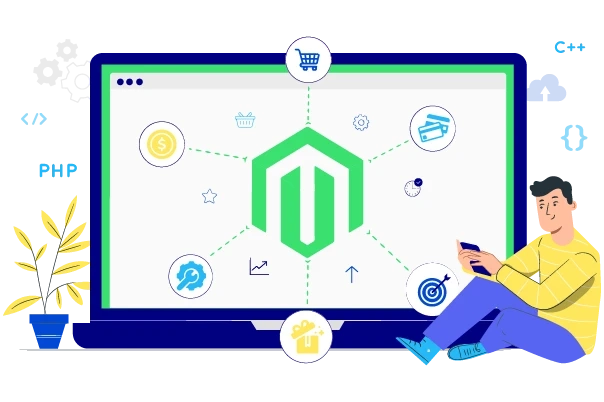In today’s hyper-competitive digital commerce landscape, Magento continues to dominate as a powerful open-source eCommerce platform. As the eCommerce industry rapidly evolves, businesses are shifting to more agile development models. One of the most impactful changes in 2025 is the surge in hiring dedicated remote Magento developers.
Whether you're launching a new Magento store or scaling an existing one, hiring dedicated professionals who work remotely can significantly boost innovation, streamline operations, and enhance profitability. Remote Magento experts bring specialized skills, global perspectives, and cost-effective solutions that are often difficult to source locally.
This post explores the strategic benefits of collaborating with remote Magento developers, outlines a clear hiring roadmap, compares remote and in-house development models, and offers practical solutions to common challenges in virtual collaboration. For businesses aiming to stay agile and competitive, one of the most impactful decisions is to hire dedicated Magento developers who can seamlessly integrate into your workflows while delivering high-quality results from anywhere in the world.
This blog is crafted for business owners, tech leads, CTOs, and eCommerce strategists looking to build a reliable, high-performance Magento team in 2025.
Benefits of Hiring Dedicated Remote Magento Developers
Cost-Effective
Hiring remote Magento developers can significantly cut down operational costs. You save on office space, hardware, utilities, and other overheads. Additionally, developers from emerging economies often provide the same quality of work as local hires at a fraction of the cost.
Access to Global Talent
With remote hiring, geographical boundaries are no longer a constraint. You gain access to a diverse pool of Magento-certified developers from across the world. This ensures you can find niche expertise that may be scarce in your local market.
Scalability and Flexibility
Need more developers during peak seasons or for a big deployment? Remote teams make it easier to scale up or down as required. You can hire specialists for specific features without committing to long-term contracts.
Round-the-Clock Productivity
When your team is spread across different time zones, your development cycle continues even outside of your business hours. This "follow-the-sun" model increases turnaround time and accelerates project delivery.
Focus on Core Business Activities
Outsourcing Magento development tasks to dedicated professionals allows your in-house team to concentrate on strategic goals like marketing, customer retention, and product development.
Expertise in Magento
Remote developers often work with various clients across industries, constantly refining their Magento skills. This means they bring not only core platform expertise but also unique, real-world insights that add value to your project.
How to Hire Dedicated Remote Magento Developers?
Define Your Project Requirements
Before you start hiring, outline your project’s scope, timelines, required skills, and goals. Do you need a Magento backend developer, a frontend specialist, or someone skilled in both?
Choose the Right Hiring Platform
Platforms like Toptal, Upwork, Freelancer, and specialized Magento agencies can connect you with vetted professionals. Assess the platform’s vetting processes, client reviews, and payment security.
Evaluate Technical Skills and Certifications
Look for Magento 2 certifications and proficiency in essential languages and frameworks like PHP, MySQL, HTML5, CSS3, JavaScript, Knockout.js, and REST APIs. Also, ensure familiarity with Composer as many developers are expected to install Magento 2 via Composer in modern development environments.
Assess Communication Skills
Remote work thrives on effective communication. During interviews, evaluate their language fluency, responsiveness, and ability to articulate complex ideas.
Review Their Portfolio and Previous Work
Request live demo links, GitHub repositories, or case studies. Check if their past work aligns with your vision and business model.
Set Clear Expectations and Milestones
Create a detailed onboarding document and define key deliverables, deadlines, communication channels, and feedback loops. Use tools like Jira, Trello, or Asana to streamline workflows.
Start with a Trial Period
Before a long-term contract, initiate a paid trial project. This helps evaluate their technical capabilities, reliability, and how well they mesh with your existing team.
Offer Competitive Pay and Benefits
Attract top talent with competitive compensation. Consider performance bonuses, paid time off, and opportunities for long-term collaboration to foster loyalty and motivation.
Difference Between Dedicated Remote Magento
Developers and In-house Developers
1. Cost
- Remote Developers: More affordable due to savings on infrastructure, office space, and operational overheads.
- In-house Developers: Higher total cost including salaries, equipment, workspace, and employee benefits.
2. Hiring Time
- Remote Developers: Faster hiring via freelance platforms, agencies, or talent networks.
- In-house Developers: Slower recruitment process with more administrative steps.
3. Scalability
- Remote Developers: Easily scalable—hire or release based on project needs.
- In-house Developers: Limited flexibility—scaling requires more time and budget.
4. Supervision
- Remote Developers: Requires digital project tracking and regular online check-ins.
- In-house Developers: Face-to-face oversight and real-time management.
5. Talent Pool
- Remote Developers: Access to a global pool of Magento experts with specialized skills.
- In-house Developers: Talent limited to the local or regional job market.
6. Availability
- Remote Developers: Potential for 24/7 productivity through distributed time zones.
- In-house Developers: Bound by local working hours and business days.
Potential Challenges of Working With Dedicated Remote Magento Developers and Solutions
Communication Barriers
Challenge: Miscommunication due to language or lack of context.
Solution: Use clear documentation, regular video calls, and collaboration tools like Slack, Notion, and Loom.
Time Zone Differences
Challenge: Scheduling meetings and real-time collaboration.
Solution: Use overlapping working hours or asynchronous updates with detailed summaries.
Limited Supervision
Challenge: Lack of visibility into daily activities.
Solution: Adopt time-tracking software and frequent check-ins to maintain accountability.
Cultural Differences
Challenge: Differing work ethics, feedback styles, or holidays.
Solution: Promote cultural sensitivity and celebrate diverse perspectives through team-building exercises.
Security Concerns
Challenge: Sharing sensitive data and access.
Solution: Use VPNs, secure repositories, NDA agreements, and role-based access control systems.
FAQs
How do remote dedicated Magento developers handle payment gateway integration?
They use Magento’s native modules or custom APIs to integrate gateways like Stripe, PayPal, and Razorpay. Security best practices such as tokenization and PCI-DSS compliance are strictly followed.
Can remote dedicated Magento developers improve my site's SEO framework?
Absolutely. They can implement technical SEO elements like schema markup, XML sitemaps, meta tags, and optimize site speed and mobile responsiveness, which are critical ranking factors.
What tech stack do remote dedicated Magento developers use?
Besides Magento 2, they typically use:
- PHP 8.x
- MySQL/MariaDB
- Composer for dependency management
- Docker for containerization
- Git/GitHub for version control
- Varnish, Elasticsearch, Redis for performance optimization
- Frontend tools: LESS, Knockout.js, RequireJS, Bootstrap
How do remote dedicated Magento developers maintain the security of my site?
They adhere to Magento’s security best practices such as:
- Regular patching and upgrades
- Two-factor authentication
- Role-based access control
- Encrypted data transmission
- Code review and penetration testing
Summary
Hiring dedicated remote Magento developers in 2025 is no longer a futuristic concept—it’s a strategic imperative. It allows businesses to access top-tier talent, scale operations flexibly, and accelerate their digital commerce objectives while optimizing costs. While remote work comes with its challenges, the benefits far outweigh them when managed effectively.
From outlining your requirements to onboarding, this guide empowers you to hire confidently and strategically. Remember, success lies not just in hiring a remote developer—but in creating an environment where they can thrive.
And whether your project is a fresh Magento deployment or a multi-store revamp, you’ll likely need to install Magento 2 via Composer an industry-standard practice today.
By embracing remote talent, you’re not just building a store; you’re building a future-proof digital experience.



